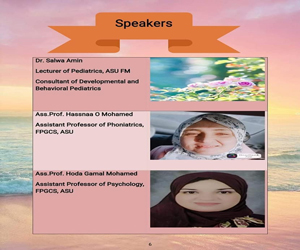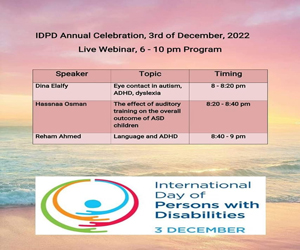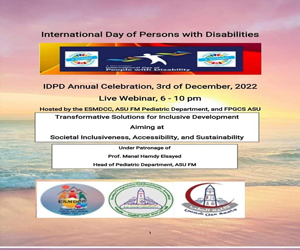On the International Day of Persons with Disabilities, "Nothing is Impossible... Yes, They Can"... A symposium at Ain Shams University
In conjunction with the celebration of the International Day of Persons with Disabilities (PDP) under the slogan “Transformational Solutions for Comprehensive Development”, which aims at societal inclusivity and accessibility, and sustainability, the Faculty of Graduate Studies for Childhood, in cooperation with the Faculty of Medicine, organized an online scientific symposium entitled “Nothing is impossible… Yes, they are.” They can”, under the auspices of Prof. Dr. Mahmoud El-Meteini, President of Ain Shams University, Prof. Dr. Ayman Saleh, Vice President of the University for Graduate Studies and Research, Prof. Dr. Howaida El-Gabali, Dean of the Faculty of Graduate Studies for Childhood, and Prof. Dr. Iman Zaki, Professor of Pediatrics at the Faculty of Pediatrics. Medicine, Ain Shams University.
 |
 |
 |
|
The symposium was coordinated by the Child Development and Behavior Disorders Unit, Department of Pediatrics, Faculty of Medicine, Ain Shams University, in cooperation with the Faculty of Graduate Studies for Childhood, Ain Shams University, and the Egyptian Society for Mental Disorders and Child Care.
The symposium was chaired and the dialogue was moderated by each Prof. Dr. Eman Ahmed Zaki, on behalf of the Board of Directors of the Egyptian Society for Mental Illness and Child Care, and Prof. Dr. Howayda Al-Jabali and a group of university professors participated in the symposium. The symposium included shedding light on what disability is, its different types, its causes, and how to deal with it in a healthy way by specialists concerned with disability affairs, policymakers, and community members with the aim of integrating people with disabilities into their communities and enjoying all rights like other physically fit people and carrying out their societal duties, Each of them according to his ability and the sustainability of their obtaining their rights by the force of the law, even in exceptional circumstances, such as those imposed on the whole world by the Covid 19 pandemic, which led to pressure on health systems, as well as an increase in deficiencies in services provided to people with disabilities.
The symposium was also concerned with reviewing the successful and inspiring models of persons with disabilities of all kinds in the various fields of life to give hope to everyone who has a disability, as well as to his family, that there is no impossible, and that they can by will and explore their capabilities and work on their development and maximizing benefit from them to be role models and role models. to others as knights of the will.
And reviewed Prof. Dr. Iman Ahmed Zaki, in her speech on the date of the celebration of this global occasion and its activation by the United Nations General Assembly, starting in 1992, also shed light on a global figure who ably led the United States of America in difficult circumstances such as the Great World Depression and World War II, which is Franklin Roosevelt, President No. 32 of the United States, who was disabled due to polio at the age of 39, and was elected President of the United States. He used crutches to assist in movement and a wheelchair for most of his movements, and the disability did not prevent him from being one of the best three presidents in American history with George Washington and Abraham Lincoln.
She concluded her speech by saying that people with disabilities, like others, are not better or worse than others, but rather they are only different in their circumstances, abilities, and needs and that it is necessary to search for the advantages and capabilities that distinguish each of them separately and to maximize the use of them and know their needs to provide them in order to be able to exercise their rights and perform their duties effectively in his community.
It is worth noting that describing people with disabilities as people of determination or knights of will is important to increase their self-confidence and respect for others for their capabilities. However, the global designation of them as people with disabilities is very important and necessary in order to make all countries in the world give them all their rights by the force of law and obligatory human rights and not as a grant or favor, especially since one of them has a severe disability and needs full care, which is guaranteed by law for life.
.svg)



